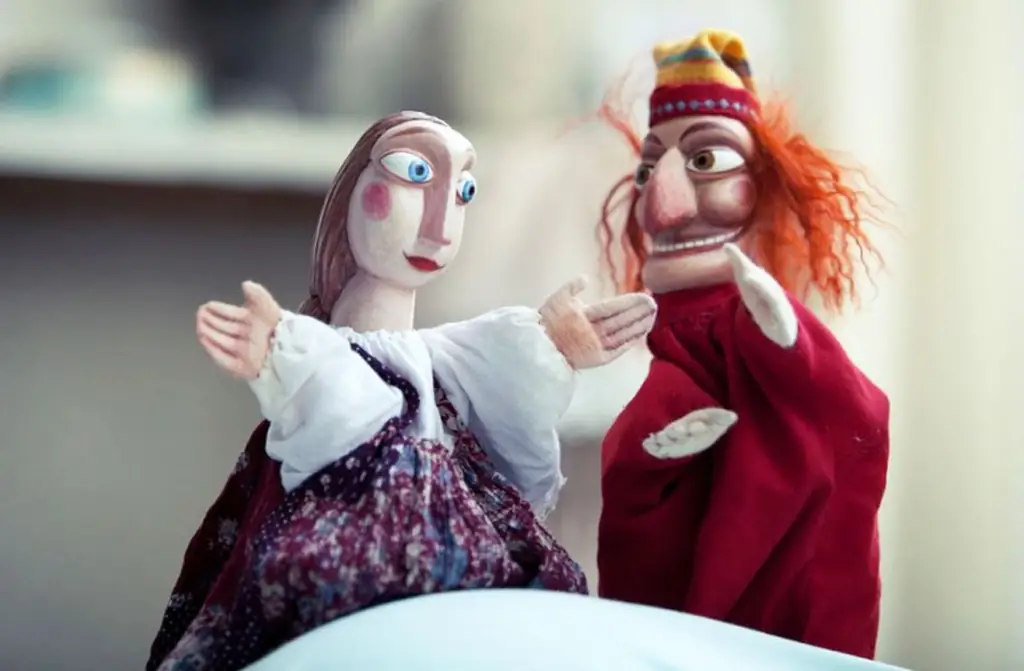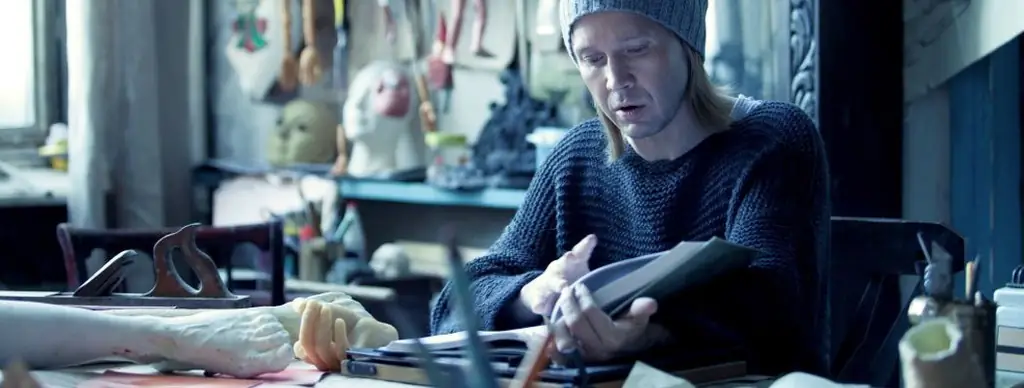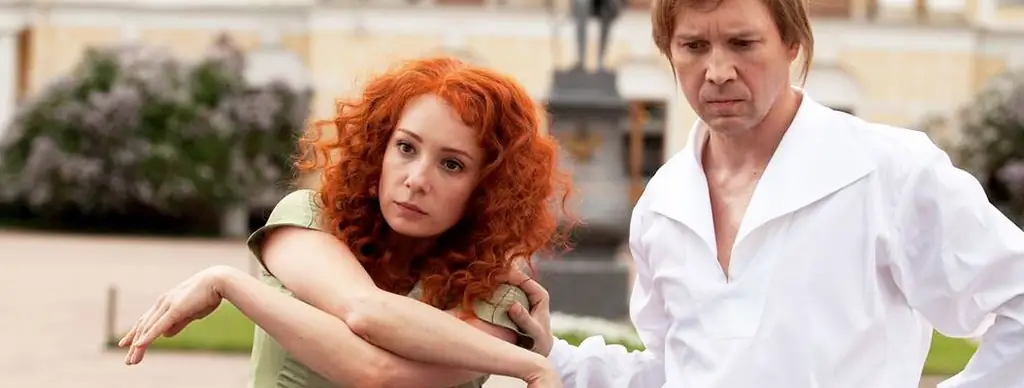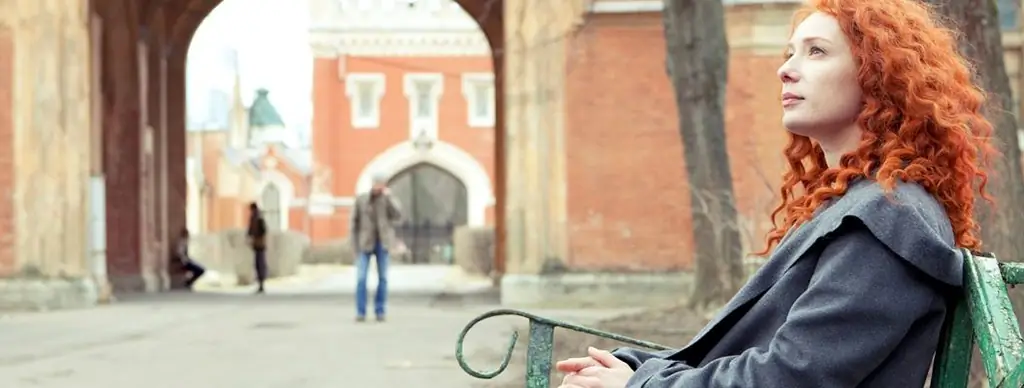- Author Adrian Jeff jeff@psychologosportal.com.
- Public 2023-12-17 05:06.
- Last modified 2025-01-24 14:09.

Film "Parsley Syndrome". When love is not a guarantee of happiness
The tape is about love and passion for creativity, about the eternal attraction and the difficulties of finding a common language between the two opposite poles of the Universe - a man and a woman. To see the deep psychological reasons for what is happening on the screen, it will be useful to stock up on "system glasses" - knowledge of Yuri Burlan's System-Vector Psychology.
The film "Parsley Syndrome" by the Swiss director Elena Khazanova based on the book of the same name by Dina Rubina was released in 2015 and, although it did not have a resounding success, can still please fans of auteur chamber cinema. A complex psychological plot that makes the viewer think, the wonderful play of the stars of Russian cinema Yevgeny Mironov and Chulpan Khamatova, amazingly beautiful and mesmerizing miniatures using author's dolls - all this suggests that the film is worth watching.
The tape is about love and passion for creativity, about the eternal attraction and the difficulties of finding a common language between the two opposite poles of the Universe - a man and a woman. To see the deep psychological reasons for what is happening on the screen, it will be useful to stock up on "system glasses" - knowledge of Yuri Burlan's System-Vector Psychology.
When an invented world is more desirable than a real one
In the film, the tale is intertwined with reality. And this is a reflection of the complex inner world of the protagonist Petit, played by Yevgeny Mironov.
Petya is the bearer of the visual-sound combination of vectors. A person with sound and visual vectors is the owner of the most powerful abstract-figurative intelligence. In art, these are very talented people who are able to give their creations an extraordinary depth.
Petya is a genius puppeteer. His dolls are extraordinary: they are almost alive, each of them has its own character. Peter lives in the world of dolls invented by him and does not want to come into contact with the real world. When it comes to family life, he even says to his friend Boris: “Why are they needed at all - these children? It's trivial. It's more interesting for me to have dolls. Behind this perception of the world is a series of childhood psychological traumas.
As a child, Petya sees a red-haired woman thrown out of the window. This is imprinted in the child's mind with a subconscious horror - visual children are very impressionable. They are born with a fear of death, they must be protected from such episodes. Their enormous emotional potential needs to be developed, brought out, into love and compassion. Petya does not have such conditions. He is on his own.
His parents are not up to him. They scandal and shout all the time. For a child with a sound vector that is naturally very sensitive to hearing, this is a real trauma.
In such conditions, the sound child is more and more fenced off from the world, plunges into himself, right up to autism. However, Petya finds a way out in playing with dolls. Sight helps sound survive in this world. Peter brings the dolls to life, talks to them, and together with them creates a parallel world based on his rich imagination. A world that lives according to laws that are understandable to a child and protects him from rough and unfair external influences.
A child's life-saving hobby develops into a profession that also completely captures all his consciousness and time. However, there is one thread that constantly connects him with reality and does not allow him to completely go into the fictional world of dolls - this is love for the red-haired Lisa.
Love and fear
He has been attached to her since childhood. She is incredibly beautiful - like a doll. Seeing her in a stroller near the store and thinking that the girl had been abandoned, the boy grabs her in his arms and carries her to show his treasure to a friend. However, it turns out that she has a father - a local prosecutor. Lisa is returned to her place, but since then a friendship has developed between the children, which then develops into the love of a lifetime. Incredible love, the kind that only two people with a visual vector are capable of.
When the young man decides to leave his provincial town to study as a puppeteer in St. Petersburg, he takes Lisa with him. The father is against such an unequal marriage, so he curses them before leaving. This has far-reaching consequences in their lives. It is not the curse itself that is scary, but the meaning that a superstitious person with a visual vector attaches to it. Both Peter and Liza have a visual vector in not very good condition, so the family legend told by their father before the departure of the young has a depressing impression on them.

According to legend, one of Liza's great-great-great-grandmothers was cursed by her innkeeper father because she ran away with her beloved person - a puppeteer. After that, a child with “Parsley's syndrome” was born in their family - there was a frozen laugh, a grimace on his face, and he himself was abnormal, laughing like a dummy. Well, it was not a tenant. After that, the puppeteer, on the advice of the old witch, made a doll - a pregnant idol, which turned the tide, and healthy red-haired girls of porcelain beauty began to be born to them.
Needless to say, a frightened visual person is capable of self-hypnosis to bring himself to illness. Liza and Petit had a child. They looked with fear at his face, seeing on it the grimace of Petrushka. The child cried all the time and died almost immediately. What was it - a congenital hereditary anomaly or embodied fears of the parents? In the film, even doctors could not give an exact answer to this question. System-vector psychology of Yuri Burlan explains that the psychological state of the mother has a decisive influence on the state of a child under six years of age.
Forehead to forehead with reality
Difficulties in family life head to head confront Peter with reality. A constantly screaming child (hearing him scream, Peter stops at the door of the apartment, not wanting to enter it), Liza is in tears and hysteria - all this again makes him withdraw from what is happening, go into creativity with his head, just not to solve problems. Gradually, he ceases to distinguish the line between reality and the world he invented.
Lisa and Peter were "the perfect couple, one in a million," as Peter himself says, but at the decisive moment he cannot help his wife overcome difficulties. Because he does not understand what is happening to him, what is happening to her. And she cannot cope with the pain of losing a child - the most severe stress for a visual person, because she does not know how.
He takes a completely devastated Lisa for treatment in a psychiatric clinic to his friend, a psychiatrist, Boris, and he himself makes a silicone doll Ellis - an exact copy of his wife. Completely immersed in the life and work of her husband, Lisa was his inspiration, his skin-visual muse. He made with her the number "Puppeteer and the Doll", which he successfully showed on numerous stages.
And now the living Lisa ceased to correspond to the world he created, and Ellis successfully replaced her. Now Peter dances with her, kisses and strokes her, admires her. At the same time, she does not hysteria, does not cry, does not require attention. She even speaks to him - he hears it.
It is not for nothing that Lisa, upon returning home, feels an acute attack of jealousy, and then the appearance of a silicone double leads to an almost complete rupture of their relationship. Liza feels that she is losing her husband, that she is no longer interested in him - alive, with all her human manifestations and shortcomings.
She is not sick - she simply does not realize all her rich visual emotional potential while sitting at home and doing housework. The death of a child, the breaking of a strong emotional connection with him, and then with her husband, leads her to a feeling of deep melancholy, which is practically incompatible with life for the viewer. She does not want to live to such an extent that she tries to commit suicide by swallowing pills. Peter saves her, and she is back in a psychiatric clinic.
It seems that she is already ready to leave him, from this life full of suffering (and this with that crazy love that still lives between them). But it cannot. She tries but fails. She says to Boris: "He made me for himself alone."

Friend and confessor
By the way, Boris is another interesting, absolutely systemic character in the film. The presence of the anal-sound bunch of vectors determined his future profession and life scenario. He becomes a psychiatrist, a person who is interested in how the human psyche works, looking for the causes of mental illness. Talented psychiatrists are all owners of the anal-sound vector bundle. Often in psychiatry they are pushed by the fear of going crazy, which is characteristic of the owners of the sound vector.
In addition, the anal vector makes Boris the most faithful friend and monogamous person. As a child, he and Peter fall in love with Lisa, but since Lisa chooses Peter, Boris respects her choice. He is a true friend and protects their relationship all his life. Although love for Lisa carries through her whole life, showing her her feelings only once, when she needs to switch to someone else.
He never marries, explaining to friends that his hobbies are so frivolous compared to their love.
Problems in our head
Still, Peter cannot lose his wife, and this makes him look for a way out. They try to have a baby again, but fear fetters Lisa, and she cannot get pregnant, although the tests are normal. Peter correctly says that the cause of infertility is in her head. This conclusion leads him to a brilliant solution.
He makes a doll - an exact copy of that innkeeper, a pregnant idol who helped Lisa's great-great-grandmother to get rid of the family curse, and passes it off as a real one. Liza is happy - now everything will be as it should. The fear goes away. She relaxes, opens up. And here is the result - a wonderful red-haired girl of porcelain beauty.
This result is natural. The psychological state of a woman affects her hormonal background. This is confirmed by Yuri Burlan's trainings on system-vector psychology, when women who have been unable to conceive for many years have a long-awaited pregnancy. In such cases, it is not mysticism and not a generic curse that is to blame for their problems, but fears and other negative states that fetter a woman and do not allow her to open up towards a new life.
What's next?
And yet the filmmakers leave us with uncertainty - what awaits the heroes of the film next? We see a happy Lisa with a baby in her arms. We see Peter walking through the streets of the city, seemingly unreal even - mummers, dolls juggling with fire pass by him, as in a dream. One gets the impression that he never left his invented world. He does not rejoice with Liza in the hard-won happiness.
System-vector psychology of Yuri Burlan helps to see their future with the utmost precision. We observe how unstable and unsettled the relationship between Lisa and Petit is during the film. This is due to their emotional swings in the visual vector. The tone of the relationship is set by the woman, she creates an emotional bond in the couple, and the man provides her with a sense of security and safety.
Skin-visual women, like Lisa, often pair up with men with ano-visual ligament vectors. The attraction between them is quite natural, and such a pair can be very stable, complementing each other at the level of the lower vectors and potentially dissolving into each other in the visual vector.

However, Peter withdraws too much into himself, shutting himself off from the outside world and not letting anyone into his inner world. Next to such a man, a skin-visual woman will not feel completely safe, at times falling into fears and tantrums, especially when she is under stress. She will not find an emotional response from him, which is why life together will lose color.
Their future relationship will not be easy either because the causes of their problems are not understood. No strong love can save a relationship from pain and destruction until partners can deal with their psychological problems, most of which come from childhood. Uncovering the secrets that are hidden deep in the unconscious is perhaps the only chance for this unusual couple.
Relationships in a couple are not only mutual joy from contact with each other, it is also a huge inner work. You need to deeply understand yourself and your partner in order to be able to consciously build relationships. You must learn to understand his feelings and desires as your own.
Now there is such knowledge - accurate and working. It is possible to keep love and create long-term happy relationships on its basis. More about this - at the training on system-vector psychology by Yuri Burlan. Register for free online lectures here.






